Unit 10 I'd like some noodles 单元综合复习课件 人教版英语七年级下册
文档属性
| 名称 | Unit 10 I'd like some noodles 单元综合复习课件 人教版英语七年级下册 |

|
|
| 格式 | pptx | ||
| 文件大小 | 32.4MB | ||
| 资源类型 | 试卷 | ||
| 版本资源 | 人教新目标(Go for it)版 | ||
| 科目 | 英语 | ||
| 更新时间 | 2024-05-31 19:21:04 | ||
图片预览

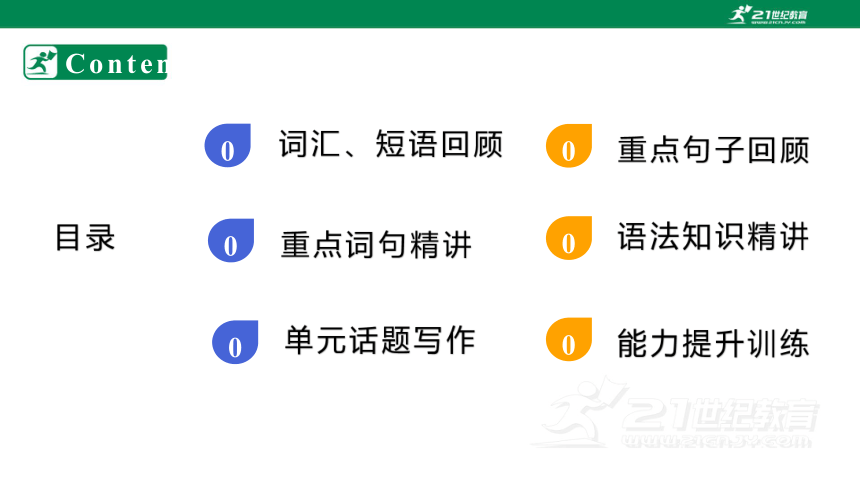

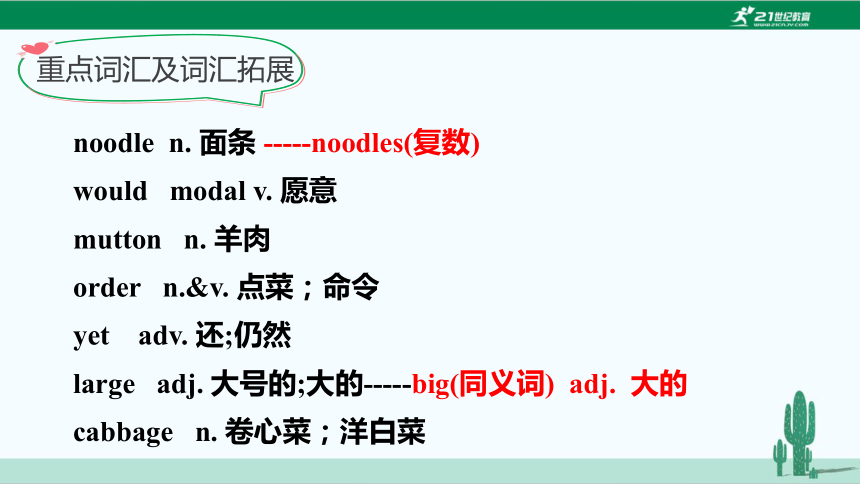
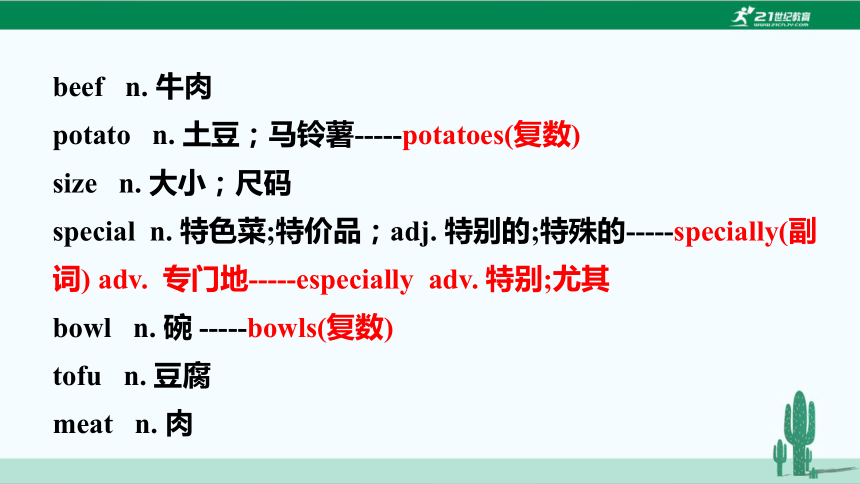
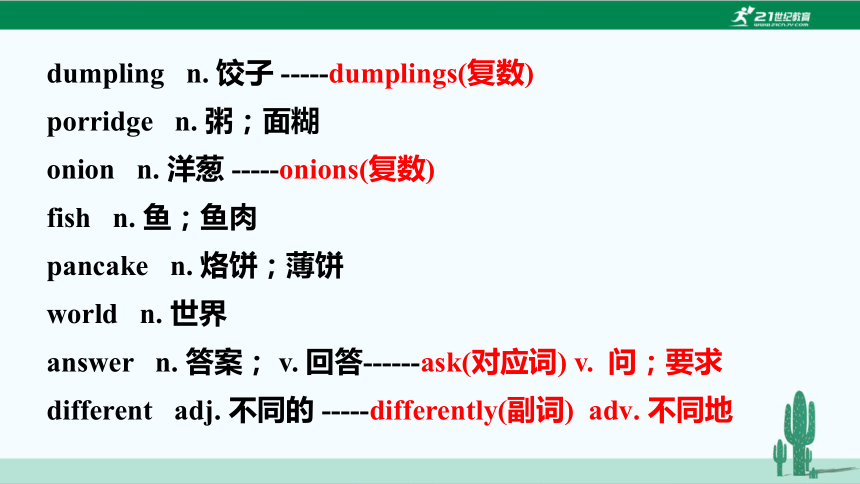
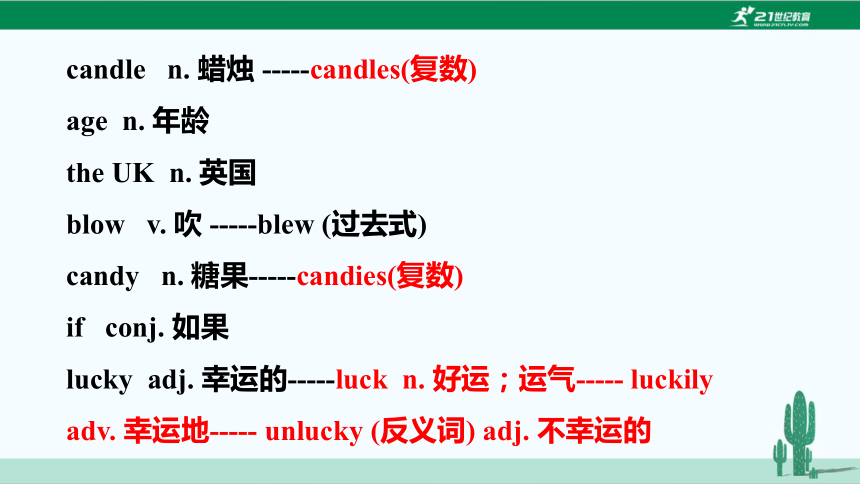
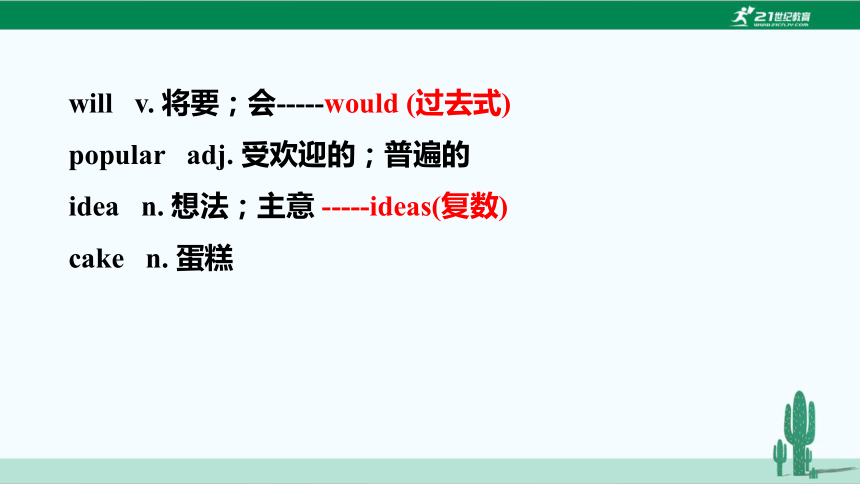
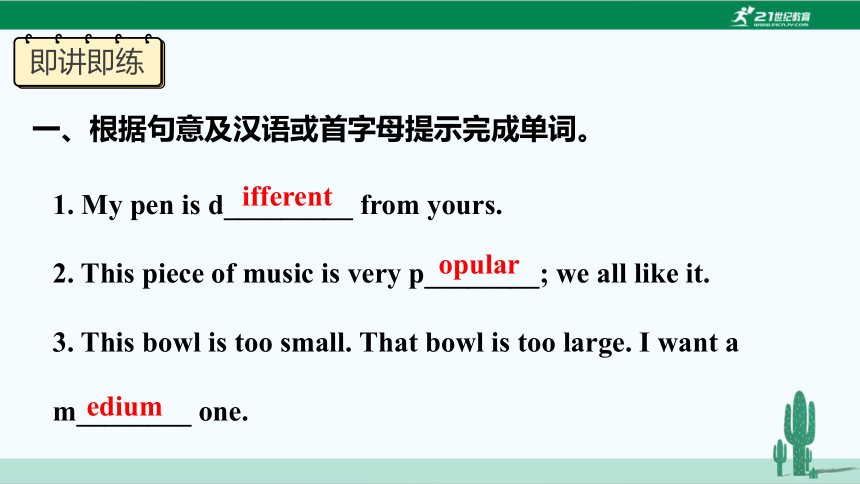


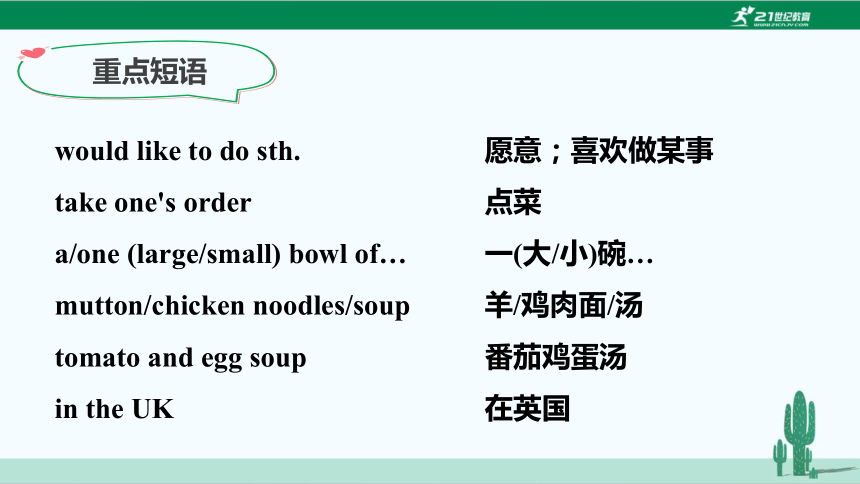
文档简介
(共73张PPT)
Unit 10 单元综合复习
人教版七年级下册
Content
词汇、短语回顾
01
重点句子回顾
02
重点词句精讲
03
语法知识精讲
04
单元话题写作
05
能力提升训练
06
目录
词汇、短语回顾
noodle n. 面条 -----noodles(复数)
would modal v. 愿意
mutton n. 羊肉
order n.&v. 点菜;命令
yet adv. 还;仍然
large adj. 大号的;大的-----big(同义词) adj. 大的
cabbage n. 卷心菜;洋白菜
重点词汇及词汇拓展
beef n. 牛肉
potato n. 土豆;马铃薯-----potatoes(复数)
size n. 大小;尺码
special n. 特色菜;特价品;adj. 特别的;特殊的-----specially(副词) adv. 专门地-----especially adv. 特别;尤其
bowl n. 碗 -----bowls(复数)
tofu n. 豆腐
meat n. 肉
dumpling n. 饺子 -----dumplings(复数)
porridge n. 粥;面糊
onion n. 洋葱 -----onions(复数)
fish n. 鱼;鱼肉
pancake n. 烙饼;薄饼
world n. 世界
answer n. 答案; v. 回答------ask(对应词) v. 问;要求
different adj. 不同的 -----differently(副词) adv. 不同地
candle n. 蜡烛 -----candles(复数)
age n. 年龄
the UK n. 英国
blow v. 吹 -----blew (过去式)
candy n. 糖果-----candies(复数)
if conj. 如果
lucky adj. 幸运的-----luck n. 好运;运气----- luckily adv. 幸运地----- unlucky (反义词) adj. 不幸运的
will v. 将要;会-----would (过去式)
popular adj. 受欢迎的;普遍的
idea n. 想法;主意 -----ideas(复数)
cake n. 蛋糕
一、根据句意及汉语或首字母提示完成单词。
即讲即练
1. My pen is d_________ from yours.
2. This piece of music is very p________; we all like it.
3. This bowl is too small. That bowl is too large. I want a m________ one.
ifferent
opular
edium
4. Can you tell me the a_________ to the question
5. I want to swim in the water like a f_______.
6. You’re a little heavy now. You’d better eat less (更少的) m______.
7. -What would you like -I am not sure y______.
nswer
ish
eat
et
8. I’m a l______ man, because I get a good job.
9. The fish s______ is very delicious.
10. -What would you like to eat
-I’d like to eat some d __________.
ucky
oup
umplings
would like to do sth. 愿意;喜欢做某事
take one's order 点菜
a/one (large/small) bowl of… 一(大/小)碗…
mutton/chicken noodles/soup 羊/鸡肉面/汤
tomato and egg soup 番茄鸡蛋汤
in the UK 在英国
重点短语
beef noodles with carrots 有胡萝卜的牛肉面
blow out 吹灭
cut up 切碎
bring good luck to… 给…带来好运
make…come true 使…成为现实
eat very long noodles 吃长寿面
on one's birthday 在某人生日那天
in different countries 在不同的国家
green tea 绿茶
the number of… …的数量
make a wish 许愿
around the world 全世界
many people 许多人
all the candles 所有的蜡烛
come true 实现
in one go 一口气
a birthday cake 一块生日蛋糕
put…into… 把…放进…里
in China 在中国
get popular 受欢迎;流行
a symbol of… …的象征
long life 长寿
good luck 好运
the same 一样
ask for 求得到
for five yuan 以五元的价格
birthday cakes with candles 带有蜡烛的生日蛋糕
即讲即练
1. 让我们打电话订一份大碗的面条吧。
Let’s make a phone to order __ _______ _____ ___ ________.
2. 请递给我一些土豆和牛肉。
Please pass me ______ _________ and ______.
3. 我能喝一碗牛肉汤吗?
Can I have _______ _______ ______ beef soup
一、根据汉语提示完成句子。
a large bowl of noodles
a bowl of
some potatoes beef
4. -你穿多大码的鞋子?-我穿18码的。
-What ______ shoes ______ you wear -I wear ______ 18.
5. 他们想要什么种类的面条?
What _______ _______ noodles _______ they like
6. 在过生日的时候人们吃什么?
______ would people like to eat ______ their birthday
7. 长面条是长寿的象征。
The long ________ are a symbol of ______ _____.
What on
kind of would
size do size
noodles long life
重点句子回顾
1.—What size would you like 你们想要多大碗的?
—I'd like a large bowl, please. 就来大碗的吧。
2.We'd like one bowl of beef soup. 我们想要一碗牛肉汤。
3. May I take your order 请问您可以点菜了吗?
4.—What kind of noodles would you like 您要什么面?
—I'd like beef noodles, please. 就要牛肉面吧。
5. We have large, medium and small bowls. 我们有大碗、中碗和小碗的。
6.The number of candies is the person's age. 蜡烛的数量是过生日人的年龄。
7.What would people like to eat on their birthday 人们在生日那天想要吃什么?
8.The answer would be different in different countries. 在不同的国家答案是不同的。
9.If he or she blows out all the candles in one go, the wish will come true.
如果他或她一口气把蜡烛吹灭,许的愿望将会实现。
10.Excuse me, there is a fly in my porridge. 打扰一下,我的粥里有一只苍蝇。
11.They bring good luck to the birthday person. 它们给过生日的人带来好运。
12.They never cut up the noodles because the long noodles are a symbol of long life.
他们从不把面条切碎因为长面条是长寿的象征。
13.Put on your glasses and you can see the mutton. 戴上你的眼镜,你就能看到羊肉了。
重点词句精讲
1.some与any的用法
● some和any既可以修饰可数名词,也可以修饰不可数名词;some一般用于肯定句,any用于否定句和疑问句中。
eg:Here is some milk for you.这儿有一些牛奶给你。
I would like some grapes.我想要一些葡萄。
I don't want any coffee. 我不想要咖啡。
I can't eat any candies.我不能吃一些糖果。
There is some milk in the glass. 玻璃杯里有一些牛奶。
● some本来是用在肯定句的,如果some用在了疑问句时,它表示请求,建议,邀请等,希望得到对方肯定回答。
eg:Can I have some milk?我能喝一些牛奶吗?
Would you like some coffee?你想喝咖啡吗?
● some还可用作代词,意为“有些;有的”。
eg:These are some of our questions. 这些是我们的一些问题。
2.would like与want
would为情态动词,所以would like没有人称、单复数和时态的变化
want为动词,有人称、单复数和时态的变化
eg:Mike would like to go hiking. 迈克想要去远足。
Mike wants to go hiking. 迈克想要去远足。
I would like to go out for walk. I like walking in the rain.
3.I'm not sure yet.
在口语中,I'm not sure.常用来表达把握性不大的事。
yet为副词,意为“还;仍然;已经”,通常用于否定句或疑问句中,置于句末。
肯定句中常用still表示“还,仍然”,用already表示“已经”。
eg:—Our teacher is coming, isn’t he
—I'm not sure. 我不太清楚。
He hasn't answered yet. 他还没有回答。
Is everything ready yet 一切都准备好了吗?
4.beef
beef n. 牛肉(不可数)
beef noodles牛肉面(这里beef作定语,修饰noodles)。
【拓展】:通常名词在另一个名词前充当定语时,用单数形式。但man和woman作定语修饰另一个名词时,要与所修饰名词的单复数保持一致。
eg:man doctor → men doctors 男医生
woman teacher → women teachers 女教师
a girl student → girl students 女学生
eg:There are two apple trees in front of my house. 我的房前有两棵苹果树。
There are 50 women teachers in our school. 我们学校有50名女教师。
Two men workers are working there. 两名男工人正在那儿工作。
5.special用法
special n. 特色菜;特价品
eg:Special 1 is my favorite. 1号特色菜是我最喜欢的。
We have some great specials. 我们有一些不错的特价品。
special adj. 特别的;特殊的
specially adv. 特别地
eg:It's a special day today. 今天是个特别的日子。
Is there anything special in the newspaper today 今天报纸上有什么特别的内容吗?
6.What kind of……would you like
what kind of 什么样的,哪种
该句型用来询问“某人想要什么样的/哪种物品”。
kind为可数名词,意为“种,种类”。
短语:a kind of(—种),all kinds of(各种各样的),different kinds of(不同种类的)。
eg:What kind of movies would you like 你想看什么样的电影?
What kind of birthday presents would you like 你想要什么样的生日礼物?
【拓展】与kind有关的短语
① “kind of+形容词”:意为“有点儿……”,相当于a little/a bit/a little bit。
eg:I'm kind of hungry.我有点儿饿了。
② “many kinds of +名词”意为“很多种……”;“this/that kind of +名词”意为“这/那一种……”。
eg:This kind of film is not popular. 这种电影不受欢迎。
③ “all kinds of +名词”意为“各种各样的……”。
eg:We have all kinds of tools. 我们有各种各样的工具。
7.May I take your order 您要点菜吗
本句为餐馆里服务员常用语。
order此处作可数名词,意为“点菜,订购”。
order也可作动词“点菜;预定”
eg:I want to give the bookshop an order for this book. 我想向书店订购这本书。
Would you like to order some bread 你想不想来些面包?
The man ordered a table for six at the restaurant.
这位先生在餐馆里订了一张六人位的桌子。
【拓展】rder的其他用法
◆ order可作动词,意为“命令,嘱咐”。
常用结构为order sb. to do sth. “命令某人做某事”。
eg:The doctor ordered him to stay there.
医生命令他呆在那儿。
◆ order可作不可数名词,意为“顺序;秩序”
eg:He found everything in the house in good order.
他发现屋子里一切都秩序井然。
8.What size
what size意为“多大型号的;多大尺码的”
size名词,意为“大小;尺码”。
eg:What size would you like 你们想要多大碗的?
What size is the room 这个房间多大?
—What size shoes do you take 你穿多大号的鞋?
—I take size eight in shoes. 我穿8号的鞋。
9.with的用法
意为“带有,具有”。
eg:He's a tall boy with short hair. 他是一个留着短发的高个子男孩儿。
We'd also like gongbao chicken and some mapo tofu with rice.
我们还要宫保鸡丁和一些带有米饭的麻婆豆腐。
“用;以;借”,表示使用工具、手段等。
eg:Cut it with a knife. 用刀把它切开。
“和……在一起”,表示伴随。
eg:Can you go to a movie with me 你能和我一起去看电彩吗?
“与……对立;反对”。
eg:I had an argument with my boss. 我跟我的老板吵了一架。
“关于.对于”,表示某种关系或适用范围。
eg:Are you pleased with the result 你对结果满意吗?
“随着,与……同时”。
eg:With these words,he left the room. 说完这些话,他离开了房间
10.fish的用法
fish意为“鱼”,是可数名词,单复数同形;fish也可加es指不同种类的鱼。fish还可意为“鱼肉”,是不可数名词。fish还可意为“钓鱼”,是动词。短语go fishing意为“去钓鱼”。
eg:I have three fish at home. 我家里有三条鱼。
There are many fishes in the sea. 大海里有很多种鱼。
I had fish for dinner. 晚餐我吃的鱼肉。
Let's go fishing this weekend. 咱们这个周末去钓鱼吧。
11.or的用法
◆ 用在两者或两者以上表示选择,意为“或”“还是”:
eg:Would you prefer tea or coffee 你喜欢茶还是咖啡?
Can you sing or dance?你会唱歌或跳舞吗?
◆ 意为“和;或者”,用在否定句中代替and。
eg:He was not clever or good-looking. 他不聪明,也长得不好看。
I don't like onions, green tea or porridge. 我不喜欢洋葱、绿茶和粥。
◆ 示一种否定的条件,意为“否则”:
eg:Come on, or we'll be late. 快点,否则我们要迟到了。
12.answer的用法
◆ answer n. 意为“答案,回答,答复”,后面常接介词to,表示“……的答案”。
eg:I don't know the answer to this question. 我不知道这个问题的答案。
◆ answer可作及物动词,意为“回答,答复,应答”。
eg:The boy can't answer this question. 那个男孩儿回答不出这个问题。
Please answer the telephone. 请接电话。
13.different的用法
different形容词,意为“不同的”。
be different from……意为“与……不同”
eg:The answer would be different in different countries. 在不同的国家将会有不同的答案。
My pen is different from yours.= My pen is not the same as yours.我的钢笔与你的钢笔不同。
14.the number of与a number of
the number of……的数量
谓语动词要用单数。
a number of 很多
修饰可数名词复数,谓语动词要用复数。number前可用large,small等词修饰,以表示程度。
eg:The number of records he has sold. 他卖出的唱片数量。
There are a number of books in the library. 图书馆里有许多书。
15.make a wish
wish作可数名词,意为“心愿,愿望,祝愿”;
make a wish意为“许个愿望”
wish作动词,意为“希望,但愿,祝愿”。
eg:My wish is to become a doctor. 我的愿望是当一名医生。
Best wishes to you for the new year! 给你新年最好的祝愿!
It's easy to make a wish, but it is difficult to make it come true.
许下愿望容易,要使愿望成真却很难。
I wish to have a good job. 我希望有一份好工作。
16.blow out
blow vi. 吹
blow out 吹灭
后接名词作宾语时,宾语可以紧跟其后,也可置于blow与out之间,但接代词作宾语时,必须放在blow与out之间。
eg:The wind is blowing hard. 风很大。
The wind blew out the candle. 风吹灭了蜡烛。
The candles were on the birthday cake, we blew them out just now.蜡烛在生日蛋糕上,我们刚刚吹灭了。
17.popular的用法
popular形容词,意为“受欢迎的;普遍的”。
be popular with sb. 受某人欢迎
eg:In China, it is getting popular to have cake on one's birthday.在中国,生日蛋糕越来越受欢迎。
This movie is very popular. 这部电影非常受欢迎。
Jay Chou is very popular with young people. 周杰伦很受年轻人的欢迎。
18.cut up
cut up意为“切碎”。
人称代词作宾语时只能放在两词之间;名词作宾语时,可放在两词之间,也可放在up的后面。
eg:Please help me cut up the apples. 请帮我把苹果切碎。
Hand the meat to me. I'll cut it up. 把肉递给我。我要切碎它。
Cut up the bananas. 切碎香蕉。
【拓展】与cut相关的短语:
cut down砍到;砍伐cut off切断;切除cut out删除;cut in插嘴
19.表示“穿戴”的词和短语
dress宾语通常是人。
dress sb. 给……穿衣服
get dressed 穿衣服
dress oneself 某人自己穿衣服
eg:My son is now able to dress himself. 我儿子现在会自己穿衣服了。
put on“穿上,戴上",强调动作,后接衣服、鞋帽等。
eg:Put on your glasses and you can see the mutton. 戴上你的眼镜,你就会看到羊肉了。
Put on your heavy coat if you are going out. 如果你要出去,穿上你的厚大衣。
wear"穿着;戴着”,强调状态,宾语可以衣帽、饰品、奖章等
You'd better wear blue or black pants with brown shoes.
你最好穿蓝色或黑色裤子配棕色鞋子。
in介词,后接表示衣服或颜色的词,着重于服装的款式或颜色,它所构成的短语只能作表语或定语。
This is a picture of a young man in a black coat.
这是一张穿着黑色外套的年轻人的照片。
have on 意思是"穿着,戴着”
I will have on black pants and a gray shirt tomorrow.
明天我会穿黑色的长裤和一件灰色的衬衫。
语法知识精讲
would like 的用法
1.含义:
would like 意为“愿意;喜欢”,与 want意义相近,但语气比 want 委婉。
2.用法
①. 在肯定句中常与第一人称(I, we)连用,表示
意愿或委婉地表达要求、命令等。
例句: I would like some apples. 我想吃一些苹果。
②. 构成“Would you like… ” 句型,表示向对方提出客气的、有礼貌的请求、邀请、希望或询问等,意为“你(们)想要……吗?”它比“Do you want … ”要客气得多。
例句:Would you like another cup of tea 你想再喝杯茶吗?
③. would like to do sth. 意为“想要做某事”。
例句:Would you like to watch TV 你想看电视吗?
④. would like sb. to do sth. 意为“想要某人做某事”。
例句:I’d like you to meet my friend.我想要你去见我的朋友。 He’d like Jim to help him. 他想要吉姆帮助他。
3. 回答“Would you like + 名词或代词 ”的句型
时,多用“Yes, please. / No, thanks. ”;
回答“Would you like + to do sth. ”的句型时,
多用“Yes, I’d like to. But I / we …”。
some 和 any的用法
相同点:均可修饰可数名词和不可数名词,表示
“一些”,即不确定的数量。
不同点:some 一般用于肯定句中,也可用于建议
或请求的疑问句中,表示说话人希望得
到肯定的回答。
any 多用于疑问句、否定句或条件句中,用于肯定句时表示“任何(一个/ 一些)”。
翻译:There is some water in the cup. 杯子里有一些水。
I don’t want to eat any meat. 我不想吃肉。
单元话题写作
单元话题写作
单元写作目标
此单元以“食物”为话题,重点学习了就餐时的常用句型, 以及有关食物方面的可数名词和不可数名词,此外还学习了不同国家的饮食习惯。具体到书面表达中,要求同学们掌握有关就餐的常用句型,同时还要学会写食品广告。
素材积累
相关词汇:
1. (表示意愿)愿意;喜欢 would like 2. 点菜 take one’s order
3. 一(大)碗 one (large) bowl of 4. 世界各地 around the world
5. 许愿 make a wish 6. 吹灭 blow out
7. 受欢迎;流行 get popular 8. 切碎 cut up
9. ……的数量 the number of…
10. 给……带来好运 bring good luck to…
相关句型:
1.Welcome to Pancake House.
2.Would you like to eat ice-cream
中间句
1.We have some great specials.
2.We have different kinds of fruit ice-cream.
3.The small pancake with cabbage and carrots is just 3 yuan.
结尾句
1.Come and enjoy the delicious ice-cream!
2.You will really enjoy the food here.
3.You can call us at 497-7658.
范例
假如你是“好再来”餐馆的店主,请你为你的餐馆写一则广告,需包含以下信息:
①特色食品及其价格;
②餐馆的具体位置及路线。
审题:
1.文体:应用文
2.时态:一般现在时
3.人称:第三人称
Come and enjoy your meals at Haozailai Restaurant! Do you like mutton noodles We have large bowls of mutton noodles for only 15 yuan. How about fruit and vegetable salad There are carrots, oranges and cabbage in it. It is only 10 yuan!
Our restaurant is on Weiyang Road and it is across from the library. There is a subway station next to the restaurant. It only takes you 10 minutes to get here by subway.
Welcome to Haozailai Restaurant.
能力提升训练
一、用括号内所给单词的适当形式填空。
1. Most man don’t like go _________ (shop).
2. The wind__________ (blow) hard now.
3. I’d like ___________ (order) a large bowl of beef noodles.
4. The Pizza House has some great _________ (special).
5. They would like _______ (potato) noodles.
shopping
to order
specials
is blowing
potato
6. There are shoes of all _______ (size) in the supermarket.
7. Everyone _______ (love) oranges. They are sweet and juicy.
8. I don’t like eating _________ (orange), but I like to drink _______ (orange).
9. She’d like some ________ (tomato), she doesn’t like ___________ (strawberry).
10. We have some _______ (fish) for lunch.
oranges
sizes
loves
fish
tomatoes
orange
strawberries
二、根据括号内的要求完成下列各题,每空一词。
1. My pencil isn’t the same as yours. (改为同义句)
My pencil is _______ _______ yours.
2. His age is 17. (改为同义句)
He is 17 _______ _______.
3. People would like to eat long noodles on their birthday. (就划线部分提问)
______ _______ people ______ _______ eat on their birthday
different from
years old
What would like to
4. I’d like to go to the movies. (就划线部分提问)
______ ______ you like _______ _______
5. I’d like some tomatoes. (改为一般疑问句)
______ you like ______ tomatoes
6. She’d like a medium bag of apples. (就划线部分提问)
_______ _______ bag of apples would she like
7. They’d like a medium bowl of noodles. (改为同义句)
They______ a medium bowl of noodles.
What would to do
Would some
What size
want
三、书面表达
请根据下面的汉语提示,写一篇英语短文,不少于80词。
今天是星期天,格林夫妇带着儿子吉姆到House of Noodles去吃午饭。格林先生要了一大碗牛肉面,格林夫人要了一中碗鸡肉胡萝卜面,吉姆要了一小碗西红柿鸡蛋面,他们还喝了三杯绿茶,一共花了二十美元,他们过得很愉快。
One possible version:
Today is Sunday. Mr. and Mrs. Green don’t go to work. Now it’s 12 o’clock. They take their son, Jim, to the House of Noodles for lunch. There Mr. Green has a large bowl of beef noodles. Mrs. Green has a medium bowl of chicken and carrot noodles. And Jim has a small bowl of tomato and egg noodles. They also have three glasses of green tea. The noodles and the tea are 20 dollars in all. They have a good time.
谢谢
21世纪教育网(www.21cnjy.com)
中小学教育资源网站
兼职招聘:
https://www.21cnjy.com/recruitment/home/admin
Unit 10 单元综合复习
人教版七年级下册
Content
词汇、短语回顾
01
重点句子回顾
02
重点词句精讲
03
语法知识精讲
04
单元话题写作
05
能力提升训练
06
目录
词汇、短语回顾
noodle n. 面条 -----noodles(复数)
would modal v. 愿意
mutton n. 羊肉
order n.&v. 点菜;命令
yet adv. 还;仍然
large adj. 大号的;大的-----big(同义词) adj. 大的
cabbage n. 卷心菜;洋白菜
重点词汇及词汇拓展
beef n. 牛肉
potato n. 土豆;马铃薯-----potatoes(复数)
size n. 大小;尺码
special n. 特色菜;特价品;adj. 特别的;特殊的-----specially(副词) adv. 专门地-----especially adv. 特别;尤其
bowl n. 碗 -----bowls(复数)
tofu n. 豆腐
meat n. 肉
dumpling n. 饺子 -----dumplings(复数)
porridge n. 粥;面糊
onion n. 洋葱 -----onions(复数)
fish n. 鱼;鱼肉
pancake n. 烙饼;薄饼
world n. 世界
answer n. 答案; v. 回答------ask(对应词) v. 问;要求
different adj. 不同的 -----differently(副词) adv. 不同地
candle n. 蜡烛 -----candles(复数)
age n. 年龄
the UK n. 英国
blow v. 吹 -----blew (过去式)
candy n. 糖果-----candies(复数)
if conj. 如果
lucky adj. 幸运的-----luck n. 好运;运气----- luckily adv. 幸运地----- unlucky (反义词) adj. 不幸运的
will v. 将要;会-----would (过去式)
popular adj. 受欢迎的;普遍的
idea n. 想法;主意 -----ideas(复数)
cake n. 蛋糕
一、根据句意及汉语或首字母提示完成单词。
即讲即练
1. My pen is d_________ from yours.
2. This piece of music is very p________; we all like it.
3. This bowl is too small. That bowl is too large. I want a m________ one.
ifferent
opular
edium
4. Can you tell me the a_________ to the question
5. I want to swim in the water like a f_______.
6. You’re a little heavy now. You’d better eat less (更少的) m______.
7. -What would you like -I am not sure y______.
nswer
ish
eat
et
8. I’m a l______ man, because I get a good job.
9. The fish s______ is very delicious.
10. -What would you like to eat
-I’d like to eat some d __________.
ucky
oup
umplings
would like to do sth. 愿意;喜欢做某事
take one's order 点菜
a/one (large/small) bowl of… 一(大/小)碗…
mutton/chicken noodles/soup 羊/鸡肉面/汤
tomato and egg soup 番茄鸡蛋汤
in the UK 在英国
重点短语
beef noodles with carrots 有胡萝卜的牛肉面
blow out 吹灭
cut up 切碎
bring good luck to… 给…带来好运
make…come true 使…成为现实
eat very long noodles 吃长寿面
on one's birthday 在某人生日那天
in different countries 在不同的国家
green tea 绿茶
the number of… …的数量
make a wish 许愿
around the world 全世界
many people 许多人
all the candles 所有的蜡烛
come true 实现
in one go 一口气
a birthday cake 一块生日蛋糕
put…into… 把…放进…里
in China 在中国
get popular 受欢迎;流行
a symbol of… …的象征
long life 长寿
good luck 好运
the same 一样
ask for 求得到
for five yuan 以五元的价格
birthday cakes with candles 带有蜡烛的生日蛋糕
即讲即练
1. 让我们打电话订一份大碗的面条吧。
Let’s make a phone to order __ _______ _____ ___ ________.
2. 请递给我一些土豆和牛肉。
Please pass me ______ _________ and ______.
3. 我能喝一碗牛肉汤吗?
Can I have _______ _______ ______ beef soup
一、根据汉语提示完成句子。
a large bowl of noodles
a bowl of
some potatoes beef
4. -你穿多大码的鞋子?-我穿18码的。
-What ______ shoes ______ you wear -I wear ______ 18.
5. 他们想要什么种类的面条?
What _______ _______ noodles _______ they like
6. 在过生日的时候人们吃什么?
______ would people like to eat ______ their birthday
7. 长面条是长寿的象征。
The long ________ are a symbol of ______ _____.
What on
kind of would
size do size
noodles long life
重点句子回顾
1.—What size would you like 你们想要多大碗的?
—I'd like a large bowl, please. 就来大碗的吧。
2.We'd like one bowl of beef soup. 我们想要一碗牛肉汤。
3. May I take your order 请问您可以点菜了吗?
4.—What kind of noodles would you like 您要什么面?
—I'd like beef noodles, please. 就要牛肉面吧。
5. We have large, medium and small bowls. 我们有大碗、中碗和小碗的。
6.The number of candies is the person's age. 蜡烛的数量是过生日人的年龄。
7.What would people like to eat on their birthday 人们在生日那天想要吃什么?
8.The answer would be different in different countries. 在不同的国家答案是不同的。
9.If he or she blows out all the candles in one go, the wish will come true.
如果他或她一口气把蜡烛吹灭,许的愿望将会实现。
10.Excuse me, there is a fly in my porridge. 打扰一下,我的粥里有一只苍蝇。
11.They bring good luck to the birthday person. 它们给过生日的人带来好运。
12.They never cut up the noodles because the long noodles are a symbol of long life.
他们从不把面条切碎因为长面条是长寿的象征。
13.Put on your glasses and you can see the mutton. 戴上你的眼镜,你就能看到羊肉了。
重点词句精讲
1.some与any的用法
● some和any既可以修饰可数名词,也可以修饰不可数名词;some一般用于肯定句,any用于否定句和疑问句中。
eg:Here is some milk for you.这儿有一些牛奶给你。
I would like some grapes.我想要一些葡萄。
I don't want any coffee. 我不想要咖啡。
I can't eat any candies.我不能吃一些糖果。
There is some milk in the glass. 玻璃杯里有一些牛奶。
● some本来是用在肯定句的,如果some用在了疑问句时,它表示请求,建议,邀请等,希望得到对方肯定回答。
eg:Can I have some milk?我能喝一些牛奶吗?
Would you like some coffee?你想喝咖啡吗?
● some还可用作代词,意为“有些;有的”。
eg:These are some of our questions. 这些是我们的一些问题。
2.would like与want
would为情态动词,所以would like没有人称、单复数和时态的变化
want为动词,有人称、单复数和时态的变化
eg:Mike would like to go hiking. 迈克想要去远足。
Mike wants to go hiking. 迈克想要去远足。
I would like to go out for walk. I like walking in the rain.
3.I'm not sure yet.
在口语中,I'm not sure.常用来表达把握性不大的事。
yet为副词,意为“还;仍然;已经”,通常用于否定句或疑问句中,置于句末。
肯定句中常用still表示“还,仍然”,用already表示“已经”。
eg:—Our teacher is coming, isn’t he
—I'm not sure. 我不太清楚。
He hasn't answered yet. 他还没有回答。
Is everything ready yet 一切都准备好了吗?
4.beef
beef n. 牛肉(不可数)
beef noodles牛肉面(这里beef作定语,修饰noodles)。
【拓展】:通常名词在另一个名词前充当定语时,用单数形式。但man和woman作定语修饰另一个名词时,要与所修饰名词的单复数保持一致。
eg:man doctor → men doctors 男医生
woman teacher → women teachers 女教师
a girl student → girl students 女学生
eg:There are two apple trees in front of my house. 我的房前有两棵苹果树。
There are 50 women teachers in our school. 我们学校有50名女教师。
Two men workers are working there. 两名男工人正在那儿工作。
5.special用法
special n. 特色菜;特价品
eg:Special 1 is my favorite. 1号特色菜是我最喜欢的。
We have some great specials. 我们有一些不错的特价品。
special adj. 特别的;特殊的
specially adv. 特别地
eg:It's a special day today. 今天是个特别的日子。
Is there anything special in the newspaper today 今天报纸上有什么特别的内容吗?
6.What kind of……would you like
what kind of 什么样的,哪种
该句型用来询问“某人想要什么样的/哪种物品”。
kind为可数名词,意为“种,种类”。
短语:a kind of(—种),all kinds of(各种各样的),different kinds of(不同种类的)。
eg:What kind of movies would you like 你想看什么样的电影?
What kind of birthday presents would you like 你想要什么样的生日礼物?
【拓展】与kind有关的短语
① “kind of+形容词”:意为“有点儿……”,相当于a little/a bit/a little bit。
eg:I'm kind of hungry.我有点儿饿了。
② “many kinds of +名词”意为“很多种……”;“this/that kind of +名词”意为“这/那一种……”。
eg:This kind of film is not popular. 这种电影不受欢迎。
③ “all kinds of +名词”意为“各种各样的……”。
eg:We have all kinds of tools. 我们有各种各样的工具。
7.May I take your order 您要点菜吗
本句为餐馆里服务员常用语。
order此处作可数名词,意为“点菜,订购”。
order也可作动词“点菜;预定”
eg:I want to give the bookshop an order for this book. 我想向书店订购这本书。
Would you like to order some bread 你想不想来些面包?
The man ordered a table for six at the restaurant.
这位先生在餐馆里订了一张六人位的桌子。
【拓展】rder的其他用法
◆ order可作动词,意为“命令,嘱咐”。
常用结构为order sb. to do sth. “命令某人做某事”。
eg:The doctor ordered him to stay there.
医生命令他呆在那儿。
◆ order可作不可数名词,意为“顺序;秩序”
eg:He found everything in the house in good order.
他发现屋子里一切都秩序井然。
8.What size
what size意为“多大型号的;多大尺码的”
size名词,意为“大小;尺码”。
eg:What size would you like 你们想要多大碗的?
What size is the room 这个房间多大?
—What size shoes do you take 你穿多大号的鞋?
—I take size eight in shoes. 我穿8号的鞋。
9.with的用法
意为“带有,具有”。
eg:He's a tall boy with short hair. 他是一个留着短发的高个子男孩儿。
We'd also like gongbao chicken and some mapo tofu with rice.
我们还要宫保鸡丁和一些带有米饭的麻婆豆腐。
“用;以;借”,表示使用工具、手段等。
eg:Cut it with a knife. 用刀把它切开。
“和……在一起”,表示伴随。
eg:Can you go to a movie with me 你能和我一起去看电彩吗?
“与……对立;反对”。
eg:I had an argument with my boss. 我跟我的老板吵了一架。
“关于.对于”,表示某种关系或适用范围。
eg:Are you pleased with the result 你对结果满意吗?
“随着,与……同时”。
eg:With these words,he left the room. 说完这些话,他离开了房间
10.fish的用法
fish意为“鱼”,是可数名词,单复数同形;fish也可加es指不同种类的鱼。fish还可意为“鱼肉”,是不可数名词。fish还可意为“钓鱼”,是动词。短语go fishing意为“去钓鱼”。
eg:I have three fish at home. 我家里有三条鱼。
There are many fishes in the sea. 大海里有很多种鱼。
I had fish for dinner. 晚餐我吃的鱼肉。
Let's go fishing this weekend. 咱们这个周末去钓鱼吧。
11.or的用法
◆ 用在两者或两者以上表示选择,意为“或”“还是”:
eg:Would you prefer tea or coffee 你喜欢茶还是咖啡?
Can you sing or dance?你会唱歌或跳舞吗?
◆ 意为“和;或者”,用在否定句中代替and。
eg:He was not clever or good-looking. 他不聪明,也长得不好看。
I don't like onions, green tea or porridge. 我不喜欢洋葱、绿茶和粥。
◆ 示一种否定的条件,意为“否则”:
eg:Come on, or we'll be late. 快点,否则我们要迟到了。
12.answer的用法
◆ answer n. 意为“答案,回答,答复”,后面常接介词to,表示“……的答案”。
eg:I don't know the answer to this question. 我不知道这个问题的答案。
◆ answer可作及物动词,意为“回答,答复,应答”。
eg:The boy can't answer this question. 那个男孩儿回答不出这个问题。
Please answer the telephone. 请接电话。
13.different的用法
different形容词,意为“不同的”。
be different from……意为“与……不同”
eg:The answer would be different in different countries. 在不同的国家将会有不同的答案。
My pen is different from yours.= My pen is not the same as yours.我的钢笔与你的钢笔不同。
14.the number of与a number of
the number of……的数量
谓语动词要用单数。
a number of 很多
修饰可数名词复数,谓语动词要用复数。number前可用large,small等词修饰,以表示程度。
eg:The number of records he has sold. 他卖出的唱片数量。
There are a number of books in the library. 图书馆里有许多书。
15.make a wish
wish作可数名词,意为“心愿,愿望,祝愿”;
make a wish意为“许个愿望”
wish作动词,意为“希望,但愿,祝愿”。
eg:My wish is to become a doctor. 我的愿望是当一名医生。
Best wishes to you for the new year! 给你新年最好的祝愿!
It's easy to make a wish, but it is difficult to make it come true.
许下愿望容易,要使愿望成真却很难。
I wish to have a good job. 我希望有一份好工作。
16.blow out
blow vi. 吹
blow out 吹灭
后接名词作宾语时,宾语可以紧跟其后,也可置于blow与out之间,但接代词作宾语时,必须放在blow与out之间。
eg:The wind is blowing hard. 风很大。
The wind blew out the candle. 风吹灭了蜡烛。
The candles were on the birthday cake, we blew them out just now.蜡烛在生日蛋糕上,我们刚刚吹灭了。
17.popular的用法
popular形容词,意为“受欢迎的;普遍的”。
be popular with sb. 受某人欢迎
eg:In China, it is getting popular to have cake on one's birthday.在中国,生日蛋糕越来越受欢迎。
This movie is very popular. 这部电影非常受欢迎。
Jay Chou is very popular with young people. 周杰伦很受年轻人的欢迎。
18.cut up
cut up意为“切碎”。
人称代词作宾语时只能放在两词之间;名词作宾语时,可放在两词之间,也可放在up的后面。
eg:Please help me cut up the apples. 请帮我把苹果切碎。
Hand the meat to me. I'll cut it up. 把肉递给我。我要切碎它。
Cut up the bananas. 切碎香蕉。
【拓展】与cut相关的短语:
cut down砍到;砍伐cut off切断;切除cut out删除;cut in插嘴
19.表示“穿戴”的词和短语
dress宾语通常是人。
dress sb. 给……穿衣服
get dressed 穿衣服
dress oneself 某人自己穿衣服
eg:My son is now able to dress himself. 我儿子现在会自己穿衣服了。
put on“穿上,戴上",强调动作,后接衣服、鞋帽等。
eg:Put on your glasses and you can see the mutton. 戴上你的眼镜,你就会看到羊肉了。
Put on your heavy coat if you are going out. 如果你要出去,穿上你的厚大衣。
wear"穿着;戴着”,强调状态,宾语可以衣帽、饰品、奖章等
You'd better wear blue or black pants with brown shoes.
你最好穿蓝色或黑色裤子配棕色鞋子。
in介词,后接表示衣服或颜色的词,着重于服装的款式或颜色,它所构成的短语只能作表语或定语。
This is a picture of a young man in a black coat.
这是一张穿着黑色外套的年轻人的照片。
have on 意思是"穿着,戴着”
I will have on black pants and a gray shirt tomorrow.
明天我会穿黑色的长裤和一件灰色的衬衫。
语法知识精讲
would like 的用法
1.含义:
would like 意为“愿意;喜欢”,与 want意义相近,但语气比 want 委婉。
2.用法
①. 在肯定句中常与第一人称(I, we)连用,表示
意愿或委婉地表达要求、命令等。
例句: I would like some apples. 我想吃一些苹果。
②. 构成“Would you like… ” 句型,表示向对方提出客气的、有礼貌的请求、邀请、希望或询问等,意为“你(们)想要……吗?”它比“Do you want … ”要客气得多。
例句:Would you like another cup of tea 你想再喝杯茶吗?
③. would like to do sth. 意为“想要做某事”。
例句:Would you like to watch TV 你想看电视吗?
④. would like sb. to do sth. 意为“想要某人做某事”。
例句:I’d like you to meet my friend.我想要你去见我的朋友。 He’d like Jim to help him. 他想要吉姆帮助他。
3. 回答“Would you like + 名词或代词 ”的句型
时,多用“Yes, please. / No, thanks. ”;
回答“Would you like + to do sth. ”的句型时,
多用“Yes, I’d like to. But I / we …”。
some 和 any的用法
相同点:均可修饰可数名词和不可数名词,表示
“一些”,即不确定的数量。
不同点:some 一般用于肯定句中,也可用于建议
或请求的疑问句中,表示说话人希望得
到肯定的回答。
any 多用于疑问句、否定句或条件句中,用于肯定句时表示“任何(一个/ 一些)”。
翻译:There is some water in the cup. 杯子里有一些水。
I don’t want to eat any meat. 我不想吃肉。
单元话题写作
单元话题写作
单元写作目标
此单元以“食物”为话题,重点学习了就餐时的常用句型, 以及有关食物方面的可数名词和不可数名词,此外还学习了不同国家的饮食习惯。具体到书面表达中,要求同学们掌握有关就餐的常用句型,同时还要学会写食品广告。
素材积累
相关词汇:
1. (表示意愿)愿意;喜欢 would like 2. 点菜 take one’s order
3. 一(大)碗 one (large) bowl of 4. 世界各地 around the world
5. 许愿 make a wish 6. 吹灭 blow out
7. 受欢迎;流行 get popular 8. 切碎 cut up
9. ……的数量 the number of…
10. 给……带来好运 bring good luck to…
相关句型:
1.Welcome to Pancake House.
2.Would you like to eat ice-cream
中间句
1.We have some great specials.
2.We have different kinds of fruit ice-cream.
3.The small pancake with cabbage and carrots is just 3 yuan.
结尾句
1.Come and enjoy the delicious ice-cream!
2.You will really enjoy the food here.
3.You can call us at 497-7658.
范例
假如你是“好再来”餐馆的店主,请你为你的餐馆写一则广告,需包含以下信息:
①特色食品及其价格;
②餐馆的具体位置及路线。
审题:
1.文体:应用文
2.时态:一般现在时
3.人称:第三人称
Come and enjoy your meals at Haozailai Restaurant! Do you like mutton noodles We have large bowls of mutton noodles for only 15 yuan. How about fruit and vegetable salad There are carrots, oranges and cabbage in it. It is only 10 yuan!
Our restaurant is on Weiyang Road and it is across from the library. There is a subway station next to the restaurant. It only takes you 10 minutes to get here by subway.
Welcome to Haozailai Restaurant.
能力提升训练
一、用括号内所给单词的适当形式填空。
1. Most man don’t like go _________ (shop).
2. The wind__________ (blow) hard now.
3. I’d like ___________ (order) a large bowl of beef noodles.
4. The Pizza House has some great _________ (special).
5. They would like _______ (potato) noodles.
shopping
to order
specials
is blowing
potato
6. There are shoes of all _______ (size) in the supermarket.
7. Everyone _______ (love) oranges. They are sweet and juicy.
8. I don’t like eating _________ (orange), but I like to drink _______ (orange).
9. She’d like some ________ (tomato), she doesn’t like ___________ (strawberry).
10. We have some _______ (fish) for lunch.
oranges
sizes
loves
fish
tomatoes
orange
strawberries
二、根据括号内的要求完成下列各题,每空一词。
1. My pencil isn’t the same as yours. (改为同义句)
My pencil is _______ _______ yours.
2. His age is 17. (改为同义句)
He is 17 _______ _______.
3. People would like to eat long noodles on their birthday. (就划线部分提问)
______ _______ people ______ _______ eat on their birthday
different from
years old
What would like to
4. I’d like to go to the movies. (就划线部分提问)
______ ______ you like _______ _______
5. I’d like some tomatoes. (改为一般疑问句)
______ you like ______ tomatoes
6. She’d like a medium bag of apples. (就划线部分提问)
_______ _______ bag of apples would she like
7. They’d like a medium bowl of noodles. (改为同义句)
They______ a medium bowl of noodles.
What would to do
Would some
What size
want
三、书面表达
请根据下面的汉语提示,写一篇英语短文,不少于80词。
今天是星期天,格林夫妇带着儿子吉姆到House of Noodles去吃午饭。格林先生要了一大碗牛肉面,格林夫人要了一中碗鸡肉胡萝卜面,吉姆要了一小碗西红柿鸡蛋面,他们还喝了三杯绿茶,一共花了二十美元,他们过得很愉快。
One possible version:
Today is Sunday. Mr. and Mrs. Green don’t go to work. Now it’s 12 o’clock. They take their son, Jim, to the House of Noodles for lunch. There Mr. Green has a large bowl of beef noodles. Mrs. Green has a medium bowl of chicken and carrot noodles. And Jim has a small bowl of tomato and egg noodles. They also have three glasses of green tea. The noodles and the tea are 20 dollars in all. They have a good time.
谢谢
21世纪教育网(www.21cnjy.com)
中小学教育资源网站
兼职招聘:
https://www.21cnjy.com/recruitment/home/admin
同课章节目录
- Unit 1 Can you play the guitar?
- Section A
- Section B
- Unit 2 What time do you go to school?
- Section A
- Section B
- Unit 3 How do you get to school?
- Section A
- Section B
- Unit 4 Don't eat in class.
- Section A
- Section B
- Unit 5 Why do you like pandas?
- Section A
- Section B
- Unit 6 I'm watching TV.
- Section A
- Section B
- Review of Units 1-6
- Unit 7 It's raining!
- Section A
- Section B
- Unit 8 Is there a post office near here?
- Section A
- Section B
- Unit 9 What does he look like?
- Section A
- Section B
- Unit 10 I'd like some noodles.
- Section A
- Section B
- Unit 11 How was your school trip?
- Section A
- Section B
- Unit 12 What did you do last weekend?
- Section A
- Section B
